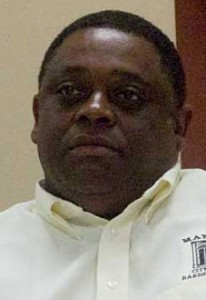AG: Fire chief discussion in closed session violated the Open Meetings law
By JIM BROOKS
Nelson County Gazette
Friday, June 29, 2012, 11:30 p.m. (UPDATED June 30, 2012, 3:30 p.m.) — The Kentucky Attorney General has ruled that Bardstown Mayor Bill Sheckles and the Bardstown City Council violated the Open Meetings Act at the Jan. 24, 2012, council meeting when it entered improperly into a two-hour closed session. The AG also ruled that the council’s discussions of the Jan. 16th firefighter election and related issues in that same closed session were also in violation of the Open Meetings Act.
In a complaint dated June 4th, Bardstown resident Kevin Brumley alleged that Mayor Bill Sheckles committed four violations of the Open Meetings act; of the four, three were procedural errors which occurred when the mayor announced the closed session.
FIRE CHIEF DISCUSSIONS VIOLATED LAW. Arguably the most significant of the four violations of the Open Meetings Act is the council’s closed session discussion of the fire chief election and how to move forward with an ordinance to strip the election process from the city’s ordinances. An ordinance approved at the next meeting did just that.
OPEN MEETINGS COMPLAINT FILES (click links to download file)
City Attorney Tom Donan admitted the fire chief ordinance discussions took place in the closed meeting, but said that the discussion was necessary for the council to have the background information to fully understand the matter in front of them. The fire chief selection process was also a personnel matter, since the issue of who would be fire chief was still undecided, he wrote.
But the Attorney General’s office disagreed with Donan, noting that in the case of a closed session related to personnel matters, the Open Meetings Act is explicit: Only the appointment, discipline or dismissal of an employee can be discussed.
“Discussion by the City Council of potential amendments to city ordinances is the epitome of activity intended by the legislature to be the subject of the Open Meetings Act,” James M. Herrick, assistant attorney general, wrote in the decision. He noted that discussions of the fire chief issue were outside the scope of the exceptions of the Open Meetings law that states “the formation of public policy is public business and shall not be conducted in secret.”
In his initial letter regarding the alleged Open Meetings Act violations, Brumley’s complaint was blistering.
“You used your position as mayor to run off behind closed doors to inform all the city ‘councilmen’ in secret about the ‘situation’ down at the fire station. You used your position as mayor to run off behind closed doors and inform your city council in secret what you thought would be the best way to handle the situation at the first station, that being a new ‘ordinance,’ to replace an alleged “ambiguous” that had been in place since the mid 1920s.“
Brumley’s complaint alleges the Jan. 24th closed session was “to talk about your need for an ‘ordinance’ that gave you power and dominion not only of the Bardstown Fire Department but gave you control through a relationship clause over an incorporated Fire Department, the Bardstown/Nelson County Volunteer Fire Department and about fire station ‘situations.'”
FIRE CHIEF BACKGROUND. On Jan. 16, the member of the Bardstown-Nelson County Volunteer Firefighters — aka “the corporation” — voted Marlin Howard as chief to replace Anthony Mattingly. However, City Hall did not recognize the firefighter’s election process as outlined in its own ordinances.
In documents related to Brumley’s complaint, Donan noted that the fire chief election ordinance failed to identify who were considered members of the city fire department. At the time the ordinance was written and last revised, the city had no paid firefighters. Several paid firefighters are on the city’s payroll.
FAILED TO STATE REASONS FOR CLOSED SESSION. In the minutes for the Jan. 24th council meeting Sheckles noted the closed session was to discuss the “appointment, discipline or dismissal of an individual employee.” Brumley’s complaint noted that the Open Meetings Act requires the agency to select one of the three actions, not all three.
In his response, Donan said the city followed the law. However the AG’s office again agreed with Brumley.
“Since the Mayor failed to indicate which action was contemplated, and there is no suggestion that all three could have been at issue, we find the closed session was conducted in violation of the Open Meetings Act,” Herrick wrote in the decision.
The AG also agreed with Brumley’s complaint that Sheckles failed to state both the reason for the closed session and the general nature of the business to be conducted both of which are required by law.
The City has the right to appeal. It has not appealed earlier Attorney General opinions that found it in violation of Open Meeting and Open Record statutes.
-30-







